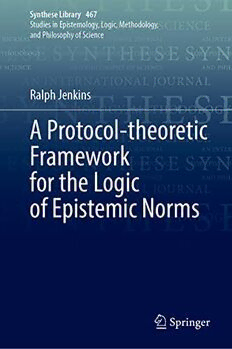Table Of ContentSynthese Library 467
Studies in Epistemology, Logic, Methodology,
and Philosophy of Science
Ralph Jenkins
A Protocol-theoretic
Framework
for the Logic
of Epistemic Norms
Synthese Library
Studies in Epistemology, Logic, Methodology,
and Philosophy of Science
Volume 467
Editor-in-Chief
OtávioBueno,DepartmentofPhilosophy,UniversityofMiami,CoralGables,USA
EditorialBoardMembers
BeritBrogaard,UniversityofMiami,CoralGables,USA
AnjanChakravartty,DepartmentofPhilosophy,UniversityofMiami,CoralGables,
FL,USA
StevenFrench,UniversityofLeeds,Leeds,UK
CatarinaDutilhNovaes,VUAmsterdam,Amsterdam,TheNetherlands
DarrellP. Rowbottom,DepartmentofPhilosophy,LingnanUniversity,TuenMun,
HongKong
EmmaRuttkamp,DepartmentofPhilosophy,UniversityofSouthAfrica,Pretoria,
SouthAfrica
Kristie Miller, Departmentof Philosophy,Centre for Time, University of Sydney,
Sydney,Australia
The aim of Synthese Library is to provide a forum for the best current work in
themethodologyandphilosophyofscienceandinepistemology,allbroadlyunder-
stood.Awidevarietyofdifferentapproacheshavetraditionallybeenrepresentedin
theLibrary,andeveryeffortis madetomaintainthisvariety,notforits ownsake,
butbecausewebelievethattherearemanyfruitfulandilluminatingapproachesto
thephilosophyofscienceandrelateddisciplines.
Specialattentionispaidtomethodologicalstudieswhichillustratetheinterplay
of empirical and philosophical viewpoints and to contributions to the formal
(logical,set-theoretical,mathematical,information-theoretical,decision-theoretical,
etc.) methodology of empirical sciences. Likewise, the applications of logical
methodstoepistemologyaswellasphilosophicallyandmethodologicallyrelevant
studies in logic are strongly encouraged.The emphasis on logic will be tempered
by interest in the psychological,historical, and sociologicalaspects of science. In
additiontomonographsSyntheseLibrarypublishesthematicallyunifiedanthologies
and edited volumes with a well-defined topical focus inside the aim and scope of
the book series. The contributionsin the volumes are expected to be focused and
structurally organizedin accordancewith the centraltheme(s), and should be tied
togetherbyanextensiveeditorialintroductionorsetofintroductionsifthevolume
isdividedintoparts.Anextensivebibliographyandindexaremandatory.
Ralph Jenkins
A Protocol-theoretic
Framework for the Logic
of Epistemic Norms
RalphJenkins
CUNYCityCollegeofNewYork
NewYork,NY,USA
ISSN0166-6991 ISSN2542-8292 (electronic)
SyntheseLibrary
ISBN978-3-031-08596-3 ISBN978-3-031-08597-0 (eBook)
https://doi.org/10.1007/978-3-031-08597-0
©SpringerNatureSwitzerlandAG2022
Thisworkissubjecttocopyright.AllrightsarereservedbythePublisher,whetherthewholeorpartof
thematerialisconcerned,specificallytherightsoftranslation,reprinting,reuseofillustrations,recitation,
broadcasting,reproductiononmicrofilmsorinanyotherphysicalway,andtransmissionorinformation
storageandretrieval,electronicadaptation,computersoftware,orbysimilarordissimilarmethodology
nowknownorhereafterdeveloped.
Theuseofgeneraldescriptivenames,registerednames,trademarks,servicemarks,etc.inthispublication
doesnotimply,evenintheabsenceofaspecificstatement,thatsuchnamesareexemptfromtherelevant
protectivelawsandregulationsandthereforefreeforgeneraluse.
Thepublisher,theauthorsandtheeditorsaresafetoassumethattheadviceandinformationinthisbook
arebelievedtobetrueandaccurateatthedateofpublication.Neitherthepublishernortheauthorsor
theeditorsgiveawarranty,expressedorimplied,withrespecttothematerialcontainedhereinorforany
errorsoromissionsthatmayhavebeenmade.Thepublisherremainsneutralwithregardtojurisdictional
claimsinpublishedmapsandinstitutionalaffiliations.
ThisSpringerimprintispublishedbytheregisteredcompanySpringerNatureSwitzerlandAG
Theregisteredcompanyaddressis:Gewerbestrasse11,6330Cham,Switzerland
ForLouie,whosepurewarmth,attentiveness,
andconstantcompanionshiphavebeen
intertwinedwiththisprojectfromits
inception,and whoseabsenceis an
unrecoverableloss.
Preface
Epistemicrationalityisfundamentallyaregulativeconcept;thepointofitisguiding
thedeliberatecontrolofepistemicaction.Thismeansthatepistemicnormssharean
underlyingproceduralstructurewithplans,programs,oralgorithms,andthelogical
investigation of epistemic norms should reflect this procedural structure. This, in
short,isthesetofideasthatmotivatetheprojectofwhichthisbookisapart.
This bookdefinesa logicalsystem called the Protocol-theoreticLogicof Epis-
temicNorms(PLEN),itdevelopsPLENintoa formalframeworkforrepresenting
and reasoning about epistemic norms, and it shows that PLEN is theoretically
interesting and useful with regard to the aims of such a framework. In order to
motivate the project, I defend an account of epistemic norms called epistemic
proceduralism.Thisistheviewthat,invirtueoftheirindispensable,regulativerole
incognitivelife,epistemicnormsarecloselyintertwinedwith—ifnotreducibleto—
proceduralrulesthatrestrictepistemicactions,procedures,andprocesses.Epistemic
proceduralismisanabstract(orformal)andcomprehensivetheory;it’satheoryof
thestructure(orcontent),regulativefunction,andlogicofepistemicnorms,without
commitmentto any specific list of norms or accountof the structure of epistemic
states(i.e.,fullbelief,acceptance,partialbelief,...).Inotherwords,itdoesn’ttry
to tell us what the norms for (e.g.) belief change are; it providesa frameworkfor
reasoningaboutthekindsofthingsthatnormsforbeliefchangeareandhowthey
work. Nonetheless, the defense of the abstract theory does appeal to substantive
observationsaboutsuch norms,as well as their roles in cognitivelife, and it does
haveconsequencesforthecontentofsubstantivetheoriesofepistemicrationality.
ThemaintechnicalprojectofthebookisdevelopingPLEN,whichisessentially
a novel variant of propositional dynamic logic (PDL) distinguished by more or
less elaborate revisions of PDL’s syntax and semantics. The syntax encodes the
procedural content of epistemic norms by means of the well-known protocol
or program constructions of dynamic and epistemic logics. It then provides a
novel language of operators on protocols, including a range of unique protocol
equivalence relations, syntactic operations on protocols, and various procedural
relations among protocols in addition to the standard dynamic (modal) operators
of PDL. The semantics of the system then interprets protocol expressions and
vii
viii Preface
expressionsembeddingprotocolsoveraclassofdirectedmultigraph-likestructures
ratherthanthestandardlabeledtransitionsystemsormodalframes.Theintentofthe
systemistobetterrepresentepistemicdynamics,buildalogicofprotocolsatopit,
andthenshowthattheresultinglogicofprotocolsisusefulasalogicalframework
forepistemicnorms.Theresultingtheoryofepistemicnormscentersonnotionsof
norm equivalence derived from theories of process equivalence familiar from the
studyofdynamicandmodallogics.Thecanonicalaccountofprotocolequivalence
in PLEN turns out to possess a number of interesting formal features, including
satisfaction of important conditions on hyperintensional equivalence, a matter of
recentlyrecognizedimportanceinthelogicofnorms,generally.
Giventhosefoci,thisbookisprimarilyforphilosophersoflogic,philosophical
logicians, and epistemologists interested in the formalrepresentationof epistemic
dynamics, foundational topics concerning epistemic normativity, or the analysis
of normativeand proceduralcomponentsof methodologiesforbelief revisionand
theorychange.Moretechnicallyinclinedreadersinterestedinapplicationsofmodal
logics(especiallydynamiclogics)andprocesstheoriestotheanalysisofepistemic
rationality may find something of interest or use in this book. Such readers may
be disappointedwith the levelof technicaldevelopment,however,as I’vefocused
ondevelopingthe technicalpropertiesofthe formalframeworkonlywith specific
philosophical projects in mind, leaving many of the standard metatheorems as
plausibleconjectures,and I’vedeliberatelyset outto doas muchas possible with
elementarytools.
Thisbookisarevisionandrefinementoftheprojectofmydoctoraldissertation,
The PhilosophicalFoundationsof PLEN: a Protocol-theoreticLogic of Epistemic
Norms (City University of New York, Graduate Center). As such, some of the
materialhereappearsthere,thoughnoneofitappearsunchanged,nordoesanyofit
appearelsewhere.Chapters1,2,and3ofthisbookrefineandexpandthearguments
and stage-setting of Chaps. 1 and 2 of the dissertation. Chapters 4, 5, 6, and 7
of this book provide a marked refinement of the eponymous system, containing
somematerialfromChap.3ofthedissertation.Chapters8,9,and10ofthisbook
refine some of the material from Chaps. 4 and 5 of my dissertation, and move
past it considerably. There is little direct overlap, but the project here is a direct
continuationofthatinauguratedinthedissertation.
NewYork,NY,USA RalphJenkins
Acknowledgments
Iowemuchtomany.TanyaManthey,withoutwhomIwouldhavebeenlostmany
times.Mysmallcircleoffamilyandclosefriends,forwhommuchthesameistrue.
Thephilosophers,logicians,andcomputerscientistsworkingindynamic,epistemic,
deontic,andnon-classicallogics;thesefieldsaredrivenbysharpermindsthanmine,
andtheyhousemanyofthesourcesoftechnicalinventionandphilosophicalinsight
thathaveinformedthisproject,andtowhichIoweadeepdebtofgratitude.
Thisprojectcouldn’thaveseencompletionifnotforthepatienceandguidance
ofthefacultyattheGraduateCenter(CUNY),especiallythesupervisorofmydis-
sertation:GrahamPriest. Asidefromdirectlyprovidingvirtuallyendlesstechnical
guidance,philosophicalinsight, and a continualstream of letters of recommenda-
tion,Graham’scontinueddefenseanddevelopmentofdialetheismovertheyearsin
ever more diverse and surprising ways is an exemplarof the “hard core” research
strategy.It’s an examplethathasfundamentallyre-shapedmyphilosophicalgoals
and professionalaspirations. Sergei Artemov and David Papineau deserve special
considerationaspatientandsupportivedissertationcommitteemembers.
In virtue of this project’s genesis from my dissertation research and my reluc-
tance to show work-in-progress, the set of philosophers I owe gratitude to for
talking these ideas through are those I associated or worked with closely during
grad school—some from my cohort, others from the rotating cast of Graham’s
dissertation supervision seminars. Nonetheless, there are too many helpful col-
leagues to name, and here is a frankly poor attempt: Daniel Weissglass, David
Nagy, Daniel Boyd, Yuval Abrams, Sophie Bishop, Erik Stei, Tommy Kivatinos,
Thomas Ferguson, Amanda Bryant, Hitoshi Omori, Filippo Casati, and Federico
MatiasPalos,andmorebesides!IfI’veomittedanyone,it’safailureofmemoryon
mypartratherthanafailureofimportantcontributionontheirs.
Thereareverymanywaysinwhichthisprojectcouldhavefailed,whetherfrom
technicalorphilosophicalerrororfromthenumerouswaysinwhichextra-academic
factorsgetin the way. Somehow,I haven’tquite runinto them face-first,yet. The
explanationliespartlyinthecombinationofguidanceandfreedomfromconstraint
provided by Graham and the Graduate Center. Another part of the explanation
is Rutgers-Newark. Where the Graduate Center guided the path of the education
ix
x Acknowledgments
and research that lead to this book,it was Rutgers-Newark’ssmall, excellent, and
deeplyencouragingphilosophydepartment—andJeffBuechner,inparticular—that
groundedtherootstateandtheinitialstepsofthatpath.
Specialthanksto:JohnMacFarlaneforgraciouslylettingmeciteanunpublished
paper,ananonymousreviewerthatharshly(andrightly)rejectedanearlierversion
ofthisbook,andanotheranonymousreviewerthatcheckedmytechnicalworkand
providedencouragingandhelpfulsuggestions.

